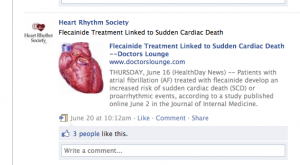July 18th, 2011 by John Mandrola, M.D. in Opinion, Research
1 Comment »

What should I have told the doctor who recently asked me about dronedarone (Multaq)?
“Supposedly, it’s [Multaq] just like Amiodarone, but without the side effects?” he asked.
Gosh…Should I, or shouldn’t I?
I took a big cleansing breath, reminding myself to stay civil, as at least Sanofi-Aventis, the makers of Multaq, sponsor a cycling team. Then I gave him my long answer:
I started with the fact that Multaq barely made it through the approval process. One of the original studies with Multaq (ANDROMEDA), a randomized trial of Multaq in patients with severe heart failure, showed that patients who took the drug were twice as likely to die.
Multaq eventually won approval for use in patients without significant heart failure and mild forms of AF, based on the results of the ATHENA trial—which randomized 4628 patients with non-permanent AF to either standard therapy or standard therapy plus Multaq. The ATHENA investigators didn’t exactly say that Multaq works, rather they claimed that it reduced a composite of hospitalizations and death.
This started the marketing machine in motion, the likes of which I have not ever witnessed. Read more »
*This blog post was originally published at Dr John M*
July 10th, 2011 by John Mandrola, M.D. in True Stories
No Comments »

The staff was concerned that she came to the office without her interpreter.
How would we communicate? How would I assess her symptoms?
“Should we get a translator from the hospital?” they asked.
I knew this patient well. I had done battle with rogue circuits in her left atrium more than once. I could even remember the fractions of the fractionated potentials–the squiggles of the squiggly line. I could recall my body’s joyous sensations when burning that precarious ridge of heart muscle steadied her heart’s rhythm.
“Got it,” we say.
Or Read more »
*This blog post was originally published at Dr John M*
July 6th, 2011 by John Mandrola, M.D. in News, Research
No Comments »

I have said that the best tool for treating atrial fibrillation (AF) is education. I still strongly believe this, perhaps more then ever.
AF presents itself to people in so many different ways–from no symptoms to incapacitation. Likewise, the treatments for AF range from simple reassurance and lifestyle changes, to taking a medicine, and on to having a complex ablation[s].
Because knowledge is so important to patients with AF, I encourage them to do outside research. This surely means going on-line. The problem, of course, comes with assessing the quality of information. It reminds me of what an old professor used to profess, “no data is better than bad data.”
What’s more, the vast diversity of AF makes comparing notes with friends problematic. One person’s wonder drug may be another’s poison.
Last week, this provocative AF headline came through on one of my Google Alert emails: 
“Flecainide Treatment Linked to Sudden Cardiac Death.” Read more »
*This blog post was originally published at Dr John M*
June 1st, 2011 by DrWes in True Stories
No Comments »

It was just a visit to manage her paroxysmal atrial fibrillation. She was long overdue for the visit. So she arrived as she had so many times before: with little fanfare and folderol. She sat patiently after her weight was obtained, vitals recorded, and medications verified. Clutching her purse, whe sat patiently as the examination door opened.
“Hello, Ms. Smith, how have you been doing?”
“Wonderfully, doctor. I haven’t had any more problems with my heart rhythm.” She leaned sideways to put down her purse on the floor next to her.
“Any dizziness, lightheadedness, shortness of breath, cough?…”
“No, I’m doing fine, thankfully,” her eyes glistening.
I proceeded to complete her history and catch up on a few details with her, then moved on to the physical examination. I watched as she got up on the exam table and noted her moving a bit more slowly than I had recalled.
“Is your strength doing okay?”
“Oh sure. Never better. Just slowing down a bit is all. But I’m not sure how well I’d be doing if it weren’t for my daughter.”
“How’s that?” Read more »
*This blog post was originally published at Dr. Wes*
May 29th, 2011 by John Mandrola, M.D. in Opinion
1 Comment »

 I have been in Hamburg, Germany for the past five days. I enjoyed an amazing opportunity to visit one of the world’s most respected heart rhythm labs. Among other things, the main purpose was to learn a new way to ablate atrial fibrillation.
I have been in Hamburg, Germany for the past five days. I enjoyed an amazing opportunity to visit one of the world’s most respected heart rhythm labs. Among other things, the main purpose was to learn a new way to ablate atrial fibrillation.
It was an incredible learning experience, one for which I owe an enormous debt of gratitude to the kind and generous people of Dr Karl-Heinz Kuck’s EP lab. Though these people are famous, they treated me as a respected colleague.
Details of all that I learned regarding this newly-approved ablation technique is a matter for future posts. Suffice it to say, I already feel like a better AF doctor.
For now, may I highlight a few of the more striking differences between Europe and the States, as noted by a Kentuckian on his first trip across the Atlantic? Read more »
*This blog post was originally published at Dr John M*














